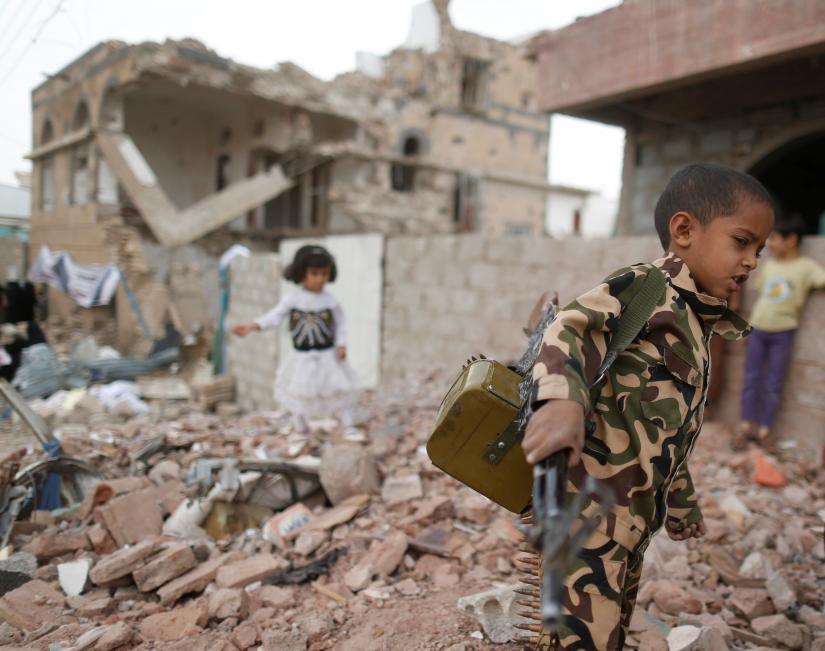 Millions of Yemenis saw an opportunity for change in 2011. Protesters inspired by the Arab Spring demanded the resignation of President Ali Abdullah Saleh. He eventually stepped down, having enjoyed power for three decades, but hopes of democracy soon faded. Four years of civil war led to what the United Nations calls the world's worst humanitarian crisis - with famine, disease and suffering being widespread.
Millions of Yemenis saw an opportunity for change in 2011. Protesters inspired by the Arab Spring demanded the resignation of President Ali Abdullah Saleh. He eventually stepped down, having enjoyed power for three decades, but hopes of democracy soon faded. Four years of civil war led to what the United Nations calls the world's worst humanitarian crisis - with famine, disease and suffering being widespread.
Speaking outright, there’s not much international interest to listen to the desperate voices of the Yemenis on the ground. Just because, they are utterly un-powerful! Again, the Yemeni political elite at the moment IS taking one side or the other in this conflict which makes it more difficult for average Yemenis who are paying the price for the endless mayhem.
We all know that the average person is starving while political parties are competing for power on the top levels. And, of course, some would say it’s not only the forgotten war but also it’s the unknown war.
Undoubtedly, the Khashoggi assassination has changed all of that and brought a lot of media attention on Yemen. However, we have to remember that powerful countries that could stop this conflict are in fact supplying the weapons to this war.
There’re countries that are now taking sides in the Iranian-Saudi proxy war. And it’s not becoming about Yemenis; it’s becoming about regional hegemony while the average Yemeni citizen who’s poor and who’s starving is the one who’s paying the price.
Ultimately, we have to remember that we’re not getting a lot of footage from the ground and it’s been really difficult to follow the developments in the conflict in a regular way, together with the overall crisis happening across the Middle East. The Yemenis are armed to the teeth. It is not just the Saudi-Emirati coalitions that have all the weapons and support, they can get. Apparently, all sides are exhausted from fighting. That is not to say that one side is more dangerous than others.
In Yemen, we see that all involved parties are exercising some form of criminality. If we’re going to talk about Arab Spring and the uprising in Yemen, there is no doubt that what the people had demanded were dignity, freedom and a democratic process. That was quickly hijacked by the political parties. But, today the Yemeni people want food, electricity, education etc.
Their demands have changed drastically. It’s important to recall that among those who started the revolution were the Youth and the independent women. But today, the youth today are the weakest faction you barely hear their voices! Many have been admitted into political parties or feel they have to ally themselves with some political entity in order to have a say of some sort. That’s really tragic. As for the women, they were such an important component of the Arab Spring. They took to the streets during the Arab Spring. They were alongside men.
As for the women, they were such an important component of the Arab Spring. They took to the streets during the Arab Spring. They were alongside men.
BUT today when you look at the Yemeni government, there’s barely any female representation. And, the role of women on the ground has become militant which is very unfortunate. All peace efforts that have to do with women are organized independently. Besides, both sides on the ground are detaining independent voices.
Recently, Yemeni activist Hisham al-Omeisy has been detained by the Houthis. We don’t know why and how long she will be detained. All we know IS that another Yemeni woman named Asmaa al-Omeisy was sentenced to death. On the other side, similar practices are happening. Such developments do not inspire confidence in the peace process.
The war continues simply because a war economy now prevails. So, the easiest way to end this war is to stop the flow of income that goes to benefit these war-sponsors, whether it’s through smuggling or financing political parties from abroad or whether it is the economy of weaponry, etc. So, the minute you dismantle that and you start funding the processes of peace the thrust of business is going to shift. The question is: how do you dismantle that and who does it? Unfortunately, it’s now become a regional conflict. And, nothing can happen without the say or will of the international actors. So, once they put their foot down very seriously on this war, then we’ll see a difference. So, the decision has to come from the top to the regional actors saying – this is enough, this is what we would like to see and we’re just going to begin the final phase two. Of course, we’ve seen many times that when the regional actors are prepared for this, we have the Houthis on the ground who would go ahead and ruin the peace process. The international actors have to just go ahead and do it because Yemenis are suffering.
We’ve talked about the looming humanitarian crisis for many years and everything that we’ve predicted has happened and you still see the very little reaction. It’s apparently a political strategy to make Yemenis suffer. It takes international actors to put their foot down and declare,' we’re not going to support different parties in this conflict just because we have interests at stake. We’re just going to support peace from now on and we’re going to make friends with everyone.'
Md. Sharif Hasan teaches International Relations at the University of Rajshahi.
 Opinion
Opinion
41319 hour(s) 13 minute(s) ago ;
Morning 10:07 ; Friday ; Jul 04, 2025
Is the World failing Yemen?
Send
Md. Sharif Hasan
Published : 16:18, Feb 21, 2019 | Updated : 16:26, Feb 21, 2019
Published : 16:18, Feb 21, 2019 | Updated : 16:26, Feb 21, 2019
0 ...0 ...
/hb/
Topics: Top Stories
***The opinions, beliefs and viewpoints expressed in this article are those of the author and do not reflect the opinions and views of Bangla Tribune.
- KOICA donates medical supplies to BSMMU
- 5 more flights to take back British nationals to London
- Covid19: Rajarbagh, Mohammadpur worst affected
- Momen joins UN solidarity song over COVID-19 combat
- Covid-19: OIC to hold special meeting
- WFP begins food distribution in Cox’s Bazar
- WFP begins food distribution in Cox’s Bazar
- 290 return home to Australia
- Third charter flight for US citizens to return home
- Dhaka proposes to postpone D8 Summit
Unauthorized use of news, image, information, etc published by Bangla Tribune is punishable by copyright law. Appropriate legal steps will be taken by the management against any person or body that infringes those laws.
Bangla Tribune is one of the most revered online newspapers in Bangladesh, due to its reputation of neutral coverage and incisive analysis.
F R Tower, 8/C Panthapath, Shukrabad, Dhaka-1207 | Phone: 58151324; 58151326, Fax: 58151329 | Mob: 01730794527, 01730794528


